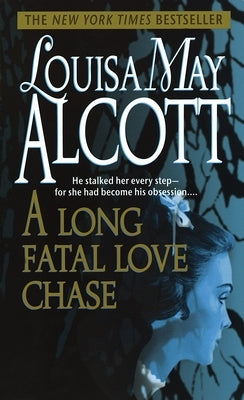"I'd gladly sell my soul to Satan for a year of freedom," cries impetuous Rosamond Vivian to her callous grandfather. Then, one stormy night, a brooding stranger appears in her remote island home, ready to take Rosamond to her word. Spellbound by the mysterious Philip Tempest, Rosamond is seduced with promises of love and freedom, then spirited away on Tempest's sumptuous yacht. But she soon finds herself trapped in a web of intrigue, cruelty, and deceit. Desperate to escape, she flees to Italy, France, and Germany, from Parisian garret to mental asylum, from convent to chateau, as Tempest stalks every step of the fiery beauty who has become his obsession.
A story of dark love and passionate obsession that was considered "too sensational" to be published in the authors lifetime,
A Long Fatal Love Chase was written for magazine serialization in 1866, two years before the publication of
Little Women. Buried among Louisa May Alcott's papers for more than a century, its publication is a literary landmark--a novel that is bold, timeless, and mesmerizing."
Author: Louisa May AlcottPublisher: Dell
Published: 12/02/1996
Pages: 368
Binding Type: Paperback
Weight: 0.40lbs
Size: 6.80h x 4.10w x 1.10d
ISBN13: 9780440223016
ISBN10: 0440223016
BISAC Categories:-
Fiction |
Literary-
Fiction |
Romance | Historical | Victorian-
Fiction |
PsychologicalAbout the Author
Louisa May Alcott, born in 1832, was the second child of Bronson Alcott of Concord, Massachusetts, a self-taught philosopher, school reformer, and utopian who was much too immersed in the world of ideas to ever succeed in supporting his family. That task fell to his wife and later to his enterprising daughter Louisa May. While her father lectured, wrote, and conversed with such famous friends as Emerson, Hawthorne, and Thoreau, Louisa taught school, worked as a seamstress and nurse, took in laundry, and even hired herself out as a domestic servant at age nineteen. The small sums she earned often kept the family from complete destitution, but it was through her writing that she finally brought them financial independence. "I will make a battering-ram of my head," she wrote in her journal, "and make a way through this rough-and-tumble world."
An enthusiastic participant in amateur theatricals since age ten, she wrote her first melodrama at age fifteen and began publishing poems and sketches at twenty-one. Her brief service as a Civil War nurse resulted in
Hospital Sketches (1863), but she earned more from the lurid thrillers she began writing in 1861 under the pseudonym of A.M. Barnard. These tales, with titles like "Pauline's Passion and Punishment," featured strong-willed and flamboyant heroines but were not identified as Alcott's work until the 1940s.
Fame and success came unexpectedly in 1868. When a publisher suggested she write a "girl's book," she drew on her memories of her childhood and wrote
Little Women, depicting herself as Jo March, while her sisters Anna, Abby May, and Elizabeth became Meg, Amy, and Beth. She re-created the high spirits of the Alcott girls and took many incidents from life but made the March family financially comfortable as the Alcotts never had been.
Little Women, to its author's surprise, struck a cord an America's largely female reading public and became a huge success. Louisa was prevailed upon to continue the story, which she did in
Little Men (1871) and
Jo's Boys (1886.) In 1873 she published
Work: A Story of Experience, an autobiography in fictional disguise with an all too appropriate title.
Now a famous writer, she continued to turn out novels and stories and to work for the women's suffrage and temperance movements, as her father had worked for the abolitionists. Bronson Alcott and Louisa May Alcott both died in Boston in the same month, March of 1888.

